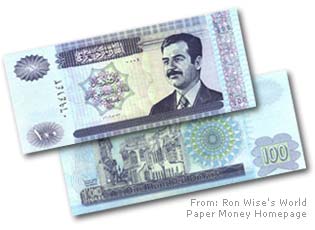NEW YORK (CNN/Money) -
The currency posting the biggest gains against the dollar in recent weeks isn't the euro or the yen -- it's the Iraqi dinar, which bears a prominent picture of vanquished President Saddam Hussein.
Reports from Baghdad say the dinar's value is soaring, reversing a slide that had accelerated during the war.
 |
|
| The value of the Saddam dinar has more than doubled versus the dollar in recent weeks. |
The Baltimore Sun reported that two weeks ago $1 could buy nearly 2,000 dinars, but this past weekend a dollar was fetching just 750 to 1,100 dinars, the strongest the Iraqi currency has been since 1996, according to the paper.
The Atlanta Journal-Constitution said a dollar was worth as much as 4,000 dinars during the fighting that began March 17 and essentially ended with the fall of Baghdad April 9. That compares with the estimated 950 dinars a dollar buys now, the newspaper reported, citing currency traders in Baghdad.
That means the dollar has lost about half of its value against the narrowly traded dinar in recent weeks and about three-quarters of its value since its high during the war. That compares with the U.S. currency's slide of about 7 percent against the euro and nearly 3 percent versus the yen over the last month.
The Atlanta newspaper said part of the change was due to the flood of U.S. dollars into Iraq from both looting of banks after the fall of Baghdad and spending by U.S. administrators, who recently paid some 1 million Iraqi government workers $20 apiece in U.S. currency. News reports estimated that up to $400 million in U.S. currency was taken by looters.
In addition, the Iraq dinar is now scarce. Banks in Iraq that closed before the war have not reopened, and the Iraq central bank is flooded by broken pipes.
The dinar is not convertible to other currencies on global markets, so it is difficult to track its value beyond anecdotal information such as news reports, said Anne Mills, a currency economist with Brown Brothers Harriman & Co.
"A nonconvertible currency, particularly a minor nonconvertible currency, is extraordinarily difficult to discuss because the market is not transparent," she said. "You don't know who the buyers and sellers are, so if the currency moves, it's harder than normal to say why it moves."
The news reports said the rise in the dinar has made Iraqis less willing to accept dollars.
"Twenty dollars is not enough for these people," Mohammed Jassin, 26, a trader at Al-Ehtemad Exchange in Baghdad, told the Journal-Constitution. "And if the Americans pay again, the rates could come down even more."
But there are more macroeconomic reasons for the sudden rise in the dinar, said Samir Zayed, emerging markets currency analyst for IDEA, an economic consultant in London. The most important is the expectation that international economic sanctions in place for 13 years could be lifted soon, and that oil exports soon could bring increased dollars.
"Lifting the sanctions by itself is going to move the economy," Zayed said. "Iraq needs a lot of imports, and coupled with the resumption of oil exports, investments are going to pour into the country. All of this will strengthen the dinar."
| Related stories
|

|
|
|
|
The U.N. Security Council voted Thursday to lift sanctions against Iraq after almost 13 years and give the United States and Britain authority to control the country until an elected government is in place. (Click here for more).
Zayed said the dinar was badly battered by years of war with Iran even before the start of sanctions following Iraq's 1990 invasion of Kuwait. The dinar's recent lows resulted from uncertainty about the war and what would follow.
"Now they [traders] are seeing the light at the end of the tunnel," he said.
Zayed said Iraq actually has two different currencies, the Saddam dinar and what is known as the Swiss dinar, used in the Kurd-controlled northern part of the country. The latter currency was not as badly battered over the past decade, he noted, adding there probably will be a push for a single currency soon.
"In Afghanistan it took about one year to have a new currency," he said. "In Iraq it might be shorter because they do have oil, which could bring in foreign exchange. But the cornerstone of any new currency is not only to have a functioning economy but also a functioning government. This is going to take some time."

|

